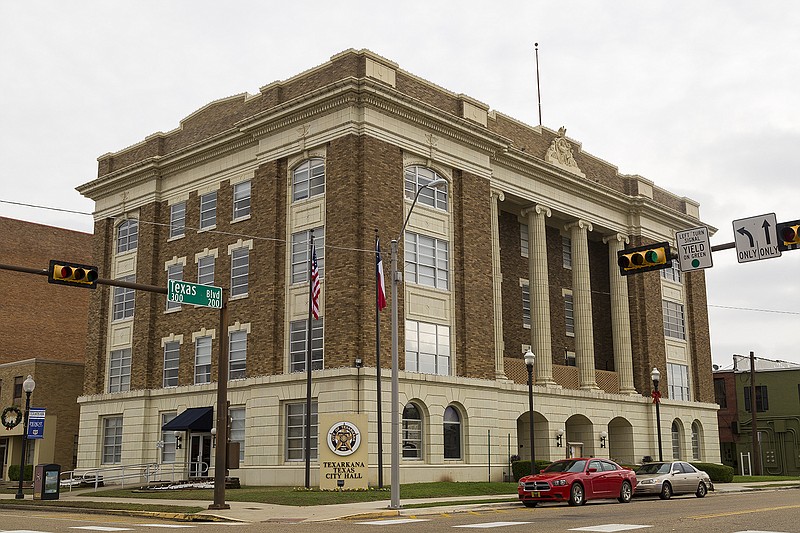As Texas-side residents prepare to vote on firefighters' collective bargaining rights, some city officials are wondering aloud how openly they can oppose the measure.
Voters will decide in November whether Texarkana, Texas, Fire Department firefighters can name an organization to represent them in employment talks with the city. If the answer is yes, they are expected to choose their union.
In a presentation to the City Council during its regular meeting Monday, City Manager John Whitson stopped short of explicitly opposing the union, instead spotlighting facts that together implied unionization would be unnecessary, expensive and out of sync with the rest of Texas.
His caution stemmed from state law restricting city employees' political advocacy, and it sparked a discussion on the law's exact meaning that at times resembled an anti-union strategy session.
The statute in question, Texas Election Code section 255.003, prohibits city officers or employees from using public resources to produce or distribute political advertising in connection with an election. It permits "communication that factually describes the purpose of a measure if the communication does not advocate passage or defeat of the measure."
"That's what I tried to very carefully do here, to make sure everything that's in this presentation is factual and not a summation on my part or trying to assume something," Whitson said at the meeting. "I tried to make sure everything here is a fact I pulled out of a document or out of some data or whatever, just trying to make sure it's factual and not an opinion on my part."
His briefing included a section titled "What is the Fire Department Doing Without Unionization?" that pointed out the department's high International Organization for Standardization rating, which results in the best possible fire insurance rates for homeowners; new fire trucks and equipment and plans to replace them regularly; and improved personnel and response staffing policies.
The section ended by noting the department's four-minute response time and three new stations opening in 2018 whose optimized locations are expected to shorten response times even more.
"They deliver that service currently. I don't know that that's going to change for anybody for any reason. We're going to do the best we can. We're going to roll whatever equipment we need. We're going to have the personnel there to respond to the emergency, whatever that is," Whitson said.
He went on to show that only 17 cities in Texas have collective bargaining for firefighters, and all but one of those has a higher population than Texarkana.
Whitson then broke down TTFD's employee demographics, pointing out that of 72 firefighters, 15 have Texarkana, Texas, mailing addresses, and of those 15, only four live within the city limits. One of those four retired this year.
"In reality, if collective bargaining passes the citizens are handing control of a large portion of your budget to people who do not reside in the city," he told the council. "They're taking it away from you, who are elected officials, and are handing it to these folks who live outside the city."
Another section was a series of graphs and tables showing that firefighters' compensation is well above Texarkana's median household income and that the recent pay raise approved for city employees was better for them than for police officers or non-civil service workers.
"Fire closed the gap on police and broadened the gap over general employees during this (pay raise) process. Fire got the greatest average increase of the three," Whitson said.
After the presentation, Ward 3 Council Member Tina Veal-Gooch asked how the city could best ensure its information was disseminated to the public, sparking an extended discussion with city legal counsel Louise Tausch on what communication is permitted under election law.
Tausch said city government could post factual information about the election and council members could respond with facts to questions about it, but any active distribution of information could be considered prohibited advertising.
She seemed to interpret the statute broadly, going so far as to recommend that council members should not discuss their opinions of unionization with constituents, even on their own time without spending public funds.
"You don't provide opinions or critiques of the other side. That's not the game plan. You provide factual information of the current city provisions and what the firefighters are doing right now.
"How you say it is just as important as what you say. Instead of the negative, which plays into the union's game plan, you provide the information, you provide the facts in a positive light. You're not attacking the union or what they say," she said.
Tausch did not immediately respond to an email seeking further clarification.
Ian Steusloff, general counsel with the Texas Ethics Commission, the state agency that enforces election law regarding political advertising, provided a narrower interpretation in an interview Tuesday. He said the key issue is whether public resources are being used.
"A public officer or employee speaking in support or opposition of a measure on their own, without using government resources, is not prohibited," he said.
In the end, Whitson agreed to prepare fact sheets for council members to provide residents upon request and suggested that private citizens could advocate in ways city employees cannot.
"If you find somebody to pick up the cause and carry that message, certainly. Just like any other issue," he said.
Election Day is Nov. 8.

